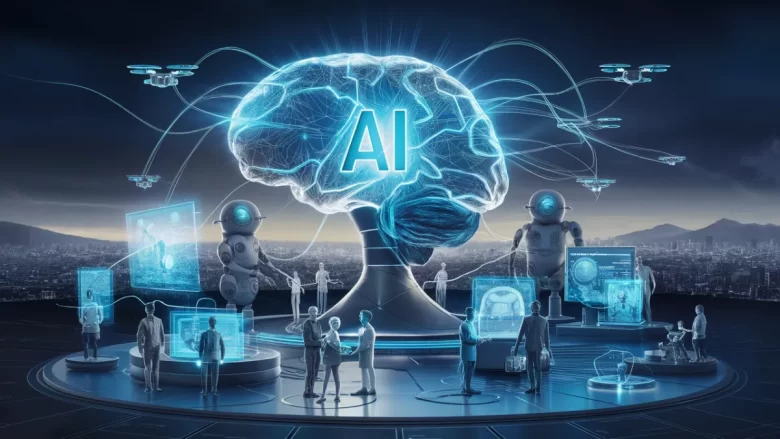Artificial Intelligence (AI) is changing the face of almost every industry including health and wellness, and this isn’t an instance. From enhancing how we keep track of our daily activities to altering the way chronic illnesses are controlled, AI is quickly becoming an integral aspect of our lives. Apps for health and wellness are making use of the capabilities of AI to build intelligent, intuitive solutions to meet modern healthcare requirements. Through providing users with advice in monitoring, guidance, and insight the apps make it easier than ever to be healthier and live a balanced lifestyle.
Through the use of enormous amounts of data AI can provide personalised solutions that are tailored to each individual’s health goals and issues. That means that the time of “one-size-fits-all” health advice are becoming less common, leading to unique strategies that cater to the individual requirements of each user. It doesn’t matter if you want to boost your fitness routine, adhere to your diet in balance or control your mental wellbeing AI-powered wellness apps are created to assist you in every step.
Personalized Fitness and Nutrition Plans
AI-powered health apps have brought personalized nutrition and fitness to a new level. Instead of relying solely on generic guidelines for diet and exercise the apps analyse user information such as age and weight, fitness level as well as dietary preferences or even patterns of sleep, to develop specific plans. In the case of For example, apps such as MyFitnessPal or apps that are powered by AI fitness coaches don’t just monitor your daily calorie intake but also recommend meals that align to your objectives whether you’re looking to shed weight, build muscle mass, or simply consume healthier food.
In the same way, AI-powered fitness applications like Strava and Fitbit make use of machine learning to adjust to user’s progress through time. These new technologies provide more intelligent workout suggestions by analyzing in actual performance data including the heart rate and intensity and frequency of activities. Through analyzing your body’s specific requirements, AI ensures sustainable and efficient fitness routines that are tailored specifically to your needs.
Mental Health Support and Monitoring
The rapid growth of AI in the field of mental health is among the most powerful application of technology. Mental health is an increasing issue in the world, and AI-powered applications like Woebot and Wysa provide answers to millions. They use the process of natural language (NLP) to provide the ability to communicate, allowing users to talk about their thoughts and feelings in a an unprejudiced, safe environment.
Furthermore to that, these AI apps are able to monitor mood changes and identify possible mental health issues like the development of anxiety or depression. With features such as the guided meditation feature and mindful, they allow users to take active steps to improve their mental wellbeing. Although they’re not a substitute for the services of therapists who are trained by AI, they do aid in making mental health resources more accessible and break the stigma and cost barriers to those who hesitate to seek assistance.
Remote Patient Monitoring and Diagnostics
AI is having an amazing impact on remote monitoring of patients and diagnosis. With the growth of telemedicine applications for health and wellness, these apps are taking over to fill the gaps in traditional health systems. These apps, which are often driven through AI algorithms, are able to monitor those suffering from chronic health issues like heart disease, diabetes or respiratory diseases. They collect information through smart sensors and wearable devices which allow doctors to monitor vital indicators such as the level of blood sugar, heart rate and blood pressure, from a distance.
Certain AI tools also come with diagnostic capabilities. Through the analysis of symptom information provided by users they are able to direct individuals towards the correct doctors or treatment programs. For instance, apps such as Ada Health analyze symptoms and offer a diagnosis in order to assist patients in making timely medical choices. This ability to access remote healthcare does not just ease the burden on healthcare systems, but provides essential services to the users’ fingertips.
AI-Driven Medication Management
The management of medications is an essential aspect of health care, particularly for those who depend on several prescriptions. AI-powered health apps have made medication management easier and more precise. These apps remind patients to take their medications keep track of dosages and issue alerts in the event of the possibility of an interaction with other medications.
Apps such as Medisafe can even employ AI to customize the schedule of medications and provide users with information on the best time and method to take their medications to ensure maximum efficacy. This is especially beneficial for people who are older or suffering from chronic illnesses, since it decreases the likelihood of ignoring doses or making critical mistakes. In addition, by ensuring that patients adhere to their the schedule of medication, AI-powered tools aid in improving overall health outcomes.
Future Trends and Innovations
A bright future for AI in wellness and health applications holds great promise. Thanks to advances in machine learning algorithms, these systems are becoming increasingly advanced in forecasting health-related trends and identifying potential risks before they escalate into major issues. For instance, AI could soon enable programs to detect strokes or heart attacks through subtle changes in health indicators.
Furthermore, technology like Augmented virtual reality (AR) as well as VR (VR) are poised to work with AI to deliver immersive immersive health and wellness experiences. Additionally genomics and predictive analytics are set to deliver more accurate health plans for patients that are based on genetic information. With these new trends in the future apps for health and wellness will get more innovative and will be seen as essential instruments in the field of health and wellness.
Challenges and Ethical Considerations
Despite its advances yet, the implementation of AI in wellness and health apps is not without problems and ethical issues. Privacy is among the main concerns for apps that gather and process sensitive health data of patients. If they are not secured the data may be at risk of being compromised or misuse.
In addition, there is the problem of equality. There are many people who do not have equal accessibility to AI instruments due to cost and internet connectivity or the different levels of technology knowledge. Making sure that everyone has access to affordable and inclusive healthcare is crucial to ensure that AI-powered healthcare is available to everyone.
Finally, even though AI can assist and inform but it is not able to replace the human judgment or medical expertise in totality. It is crucial that app developers understand how they can use their apps to allow users to make informed choices regarding their health.
FAQs
1. How can AI customize health and fitness programs?
AI analyzes information such as your fitness level, diet preferences, and your personal goals to provide you with personalized recommendations for your workouts, meal plans and more.
2. Do AI powered health applications secure to make use of?
Most trusted health apps place a high value on the privacy of their users and adhere to strict guidelines regarding data protection. Be sure to choose apps that make clear the way in which your personal data is used.
3. Can AI replace healthcare professionals?
Yes, AI improves healthcare by offering assistance, insight and monitoring tools but it’s not able to substitute the judgment, expertise and attention of skilled healthcare professionals.
4. Does AI make health apps more expensive?
Not necessarily. While certain features that are more advanced may require subscriptions, a lot of AI-powered apps are free plans to make health tools available to all.
5. How will we use AI in health applications?
Health apps powered by AI are likely to be even more advanced by incorporating features such as the ability to predict analytics using AR/VR, integrated with and personalized genomics based on the data.




